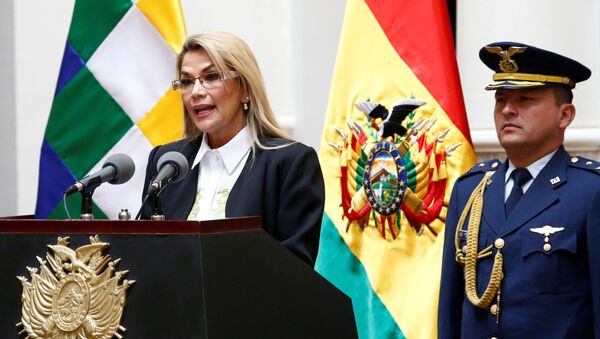President Jeanine Áñez Chávez, who led the minority faction of the Bolivian Senate before declaring herself interim president on November 13, signed the measures into law on Sunday. Áñez was able to make the power grab because the majority party, Morales’ Movimiento al Socialismo (Movement for Socialism, or MAS), was intimidated into staying away from the Senate that day, Sputnik reported, and when they attempted to return the following day to annul Áñez’s move, police blocked them.
Morales stepped down on November 10 and fled the country, receiving asylum in Mexico as right-wing forces swept into the halls of power and declared them purged of Cochamama, the indigenous goddess representing mother Earth. However, supporters of Morales from across the social spectrum, from indigenous people to workers, women and others, have rallied in the streets to oppose the overthrow of the first government to represent them in the 500 years since Spanish colonizers conquered the land.
Dozens have been killed by police, who have been given legal immunity from their actions in repressing the protests.
Patricio Zamorano, academic, international analyst and co-director of the Council on Hemispheric Affairs (COHA), told Radio Sputnik’s Loud and Clear Monday that the result is “exactly what Evo Morales was offering: basically, new elections in a matter of 120 days.”
“It’s not actually 120 days; it could be 140 days or a little bit more than that, because also they are going to take 20 days to elect a new electoral court that will supervise these new elections,” Zamorano said, noting, “it’s exactly what Evo Morales offered.”
The analyst told hosts Brian Becker and John Kiriakou one must “consider the huge cost of human lives that this coup d’etat cost to the country: several cases of people dying, thousands injured, a lot of authorities of the previous government were affected, houses burned, people were kidnapped, relatives of the people that used to be in power. And at the end of the day, the outcome is exactly what Evo Morales offered. So that’s the irony of the situation.”
“It’s been a huge crisis of human rights violations. And that’s the concern as well, because this agreement is created under this environment of constant violence, especially of conservative forces helped by the armed forces, by the police. We have to consider that, because the agreement didn’t mention at all anything about the human rights violations. The question is how this new process of elections will take place; is [how] the military, or the police forces, and the minority, right-wing coalitions in Congress will act,” he said.
“The main question is, are they going to be fair? In terms of the new elections, the MAS party, the political party of Evo Morales, will be able to compete. The big question, an often [asked] question, is if their political rights will be respected, are they going to be able to do an actual campaign? What about the candidates of MAS? Technically, Evo Morales could run as vice president, and the former vice president could run as president as well, but it seems like a minority in Congress, the right-wing minority, will try to prosecute Evo Morales as much as possible to avoid him [competing] again,” Zamorano noted.
However, Zamorano noted that Bolivia is “in a weird situation. We have to remember that the MAS government, the MAS political party, they actually have two-thirds of Congress. They are the majority party, they should … have a very relevant role in the new agreement, but they are somehow neutralized by the coup d’etat and the violence that is still happening in Bolivia.”
“Who is the candidate that will represent Evo Morales’ program, Evo Morales’ leadership and everything that the MAS party has been doing for so long?”
“We have to remember that the country has been doing great, the economy is going great, the situation of employment is under control, pretty marginal, inflation is marginal - we have a country that is very functional, that was very successful in social policies, in international trade. Everything about the economy of Bolivia is extremely well. Poverty was decreased 50%. So the question is, what’s going to happen with all that? Is the coup d’etat organizers, who are part of this agreement, and they’re going to be in charge, somehow, of the elections - are they going to be fair? Are they going to be willing to even deliver power to another center-left or left candidate?”
“Hopefully the international community is going to put pressure on Áñez’s government. Because at this point … it is very hard to believe that they are going to deliver power to another leftist,” Zamorano concluded.

